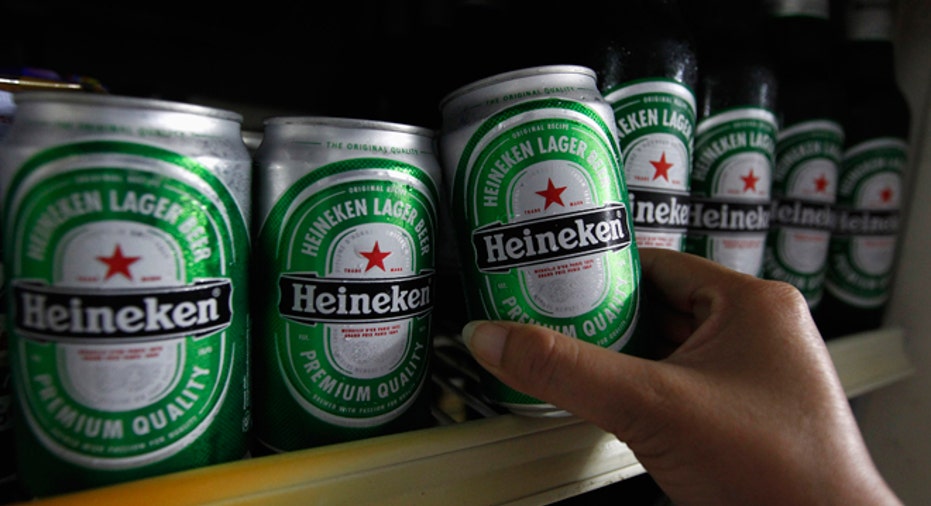Heineken Rebuffs SABMiller Takeover Offer, Revives Beer Deal Speculation

SABMiller's rejected bid for smaller brewer Heineken has revived talk about deals that could reshape the global beer industry in coming months.
Dutch company Heineken said at the weekend that it had been approached by SABMiller about a takeover, but that it had rebuffed the approach because its controlling shareholder intended to keep it independent.
The move by SABMiller, the world's No.2 brewer by market value, is seen by many analysts as either an attempt to fend off a long-rumored takeover bid from market leader Anheuser-Busch InBev - by making itself too big to swallow - or to force its larger rival to show its hand.
"We believe SABMiller could now be considered to be 'in play' and view AB InBev as a potential acquirer," said Numis analyst Wyn Ellis.
Speculation about AB InBev's desire for SABMiller - the maker of Peroni and Grolsch - has abounded for years, since the Belgian-based company with Brazilian management made its mark with a series of astute takeovers, including the $52 billion purchase of Anheuser-Busch in 2008, and aggressive cost-cutting.
The chatter intensified in recent months and again on Monday, following a report by the Wall Street Journal that said AB InBev was talking to bankers to line up financing for a potential $122 billion bid.
One source familiar with the matter told Reuters that AB InBev was not planning a bid for SABMiller at the moment, but several other sources said they still expected a sizeable deal in the global beer industry. The sector has seen so much consolidation in recent years that at least one of the big four brewers is dominant in almost every country.
Together, the big four - AB InBev, SABMiller, Heineken and Carlsberg - make well over half of all beers and lagers sold around the world.
Analysts and bankers say the logical end-game is for one of them to swallow another. Heineken is controlled by the Heineken family and Carlsberg by a foundation with a 75 percent voting share, which leaves SABMiller as the most exposed.
SAB shares closed up nearly 10 percent at a record close of 3574 pence on Monday. AB InBev and Heineken also closed at record highs.
DOMINANCE
UK-based SAB's leading shareholder is U.S. tobacco group Altria, with a near 27 percent stake, followed by BevCo with 14 percent. BevCo is the holding company of the Santo Domingo family, who sold their Colombian brewer Bavaria to SABMiller.
The biggest shareholder in AB InBev, maker of Budweiser, Stella Artois and Beck's, is a foundation that represents the interests of the Belgian and Brazilian families related to the founders of the company. It holds about 41 percent.
AB InBev is already about 50 percent larger than SABMiller, and is market leader in North America, Mexico and Brazil. Buying SABMiller would cement its dominance, giving it No.1 position in smaller Latin American markets such as Colombia and Peru, as well as Africa.
Gulping down Heineken, meanwhile, would allow SABMiller to overtake AB InBev as global leader, becoming the largest player in mature western European markets and strengthening its position in Africa.
"The fact that SAB approached Heineken to create a possible poison pill against an approach by ABI illustrates how seriously the SAB board and management views this possible scenario," said UBS analysts.
Analysts said Heineken's rejection could lead SABMiller to approach other smaller international rivals such as Carlsberg, Diageo, which makes Guinness and Red Stripe, or French drinks company Castel, whose African beer operations are already 20 percent owned by SABMiller.
However some also see Carlsberg as a potential buyer of small regional beer assets, since its controlling foundation moved last year to amend its charter to give it more financial flexibility, a change analysts said could open the door to further acquisitions.
STRETCHED
SABMiller has a market capitalisation of $89 billion, and any buyer would likely have to pay a premium of about 30 percent, analysts say.
To fund a deal at that size would likely increase AB InBev's net debt to about 6.5 times its earnings before interest, tax, depreciation and amortization (EBITDA), even after the sale of SABMiller's stake in U.S. joint venture MillerCoors to appease antitrust regulators, according to Bernstein Research analyst Trevor Stirling.
"It's conceivable but it would be stretched," Stirling said, adding the company's optimal net debt-to-EBITDA ratio was 2 times.
The company's March purchase of South Korea's Oriental Brewery raised its debt-to-EBITDA ratio to 2.49, from 2.26 at the end of 2013. That had increased from 1.94 at the end of 2012 due to the 2013 purchase of the half of Mexico's Grupo Modelo that it did not own. Analysts see it coming down soon.
"Clearly with its balance sheet leverage heading towards 2 times net debt/EBITDA and strong track record of value-creating M&A, ABI management are likely to continue to look for inorganic growth opportunities," said Barclays analysts.
The market overlap likely to upset regulators is in the United States and China, analysts have said.
AB InBev has almost half of the U.S. market and would not be allowed to add SABMiller's quarter share, held through the MillerCoors joint venture with Molson Coors.
Another issue that would need to be resolved would be the choice of soft drinks partner. AB InBev currently has ties to PepsiCo in Latin America while SABMiller has ties to Coca-Cola.
(By Martinne Geller and Philip Blenkinsop; Additional reporting by Olivia Oran in New York and Anjuli Davies in London; Editing by Pravin Char)



















